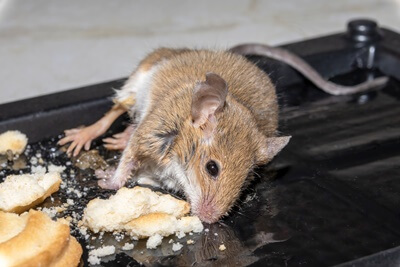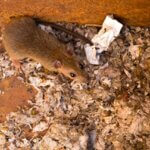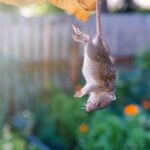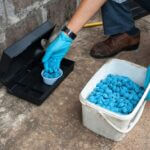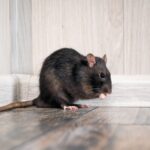The smell of a dead rat is among the worst odors in a home. Unfortunately, the pungent odor lingers in the air, worsening over time. The good news is that there are ways to remove dead rodent smells.
The stench of a dead rat may take up to 3 weeks to dissipate.
During this time, you may be exposed to hantavirus through the air. This means that finding and removing the rat is essential before addressing the odor.
A dead rat smell can be removed with enzymatic cleaners, vinegar, activated charcoal, and baking soda.
For enzymatic cleaners and activated charcoal, remove the rat and spread the solutions around the site. Also, vinegar and baking soda can be placed in bowls to neutralize odor.
Why Do Dead Rats Smell So Bad?
Rats don’t smell any worse than other pests that die in your home. All dead organisms release the same chemicals in the air, but rats smell worse because they’re larger.
For example, pests that often die indoors are insects, like cockroaches, ants, and beetles. However, these pests are small and have a hard exoskeleton, which means less rotting occurs.
A common indoor pest without an exoskeleton is a mouse. Compared to mice, rats smell worse because they’re much bigger. This means that there’s more tissue to rot and release odor.
However, the core smell is identical, so it’s hard to distinguish the smell of a dead rat from a dead mouse.
What Does A Dead Rodent Smell Like?
The smell of dead rodents will be hard to miss once you know how t recognize it.
The smell of a dead rat comes from the compounds released as its body decays, including:
- Ammonia
- Methane
- Sulfur dioxide
- Hydrogen sulfide
- Pyruvic acid
Some compare the smell of dead rats to rotting cabbage, but the smell should be more pungent. The smell will worsen faster in hot areas, as decomposition is quicker in warm areas.
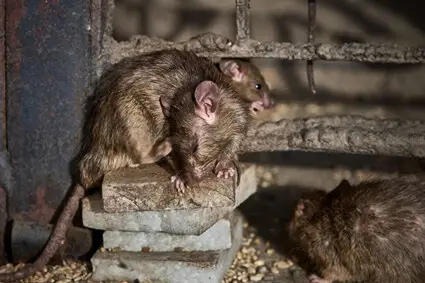
Does Dead Rat Smell Go Away
The smell of a dead rat is nothing more than the smell of the rat decomposing.
Once the rat finishes decomposing, the smell will disappear. However, while the smell of a dead rat does go away eventually, you should get rid of it before it reaches that stage.
The dead rat odor will become much stronger over time before it goes away. That’s because, as time passes, more of the dead rat’s tissues decompose simultaneously. It’s common for the smell of a dead rat to start mild before becoming unbearable in just days.
Plus, a dead rat can take a long time to decompose fully. The rate of decomposition is affected by many different factors, including the size of the rat and temperature.
The bigger the rat and the colder the temperature, the longer it’ll take to decompose.
How Long Will A Dead Rat Stink?
An average-sized rat at room temperature can take about 3 weeks to decompose. However, it can take months for the smell to completely disappear in colder climates.
How To Get Rid of A Dead Rat Smell In Your House
There are ways to remove the smell of a dead rat, including the following.
Enzymatic Cleaners
Enzymatic cleaners are the go-to option for removing pet stains and odors. While invasive rats don’t fall into this category, enzymatic cleaners are still a great way to remove their odors.
To use them, spray or wipe the solution on the source of the odor.
The solution will need to sit for 2-3 hours. If the odor remains, you may need to spray it again. You’ll also need to clean and disinfect surfaces afterward to remove any bacteria left behind.
As the name implies, Enzymatic cleaners use enzymes, which are compounds that speed up chemical reactions. Enzymatic cleaners use proteins, bacteria, and other nutrients to break down substances and remove odors.
Vinegar
Place bowls of white vinegar around your home due to its high acetic acid content. Alternatively, after removing the dead rat, wipe down the affected surfaces with white vinegar.
Granite and marble surfaces shouldn’t be cleaned with white vinegar as the acidity will cause scratches.
Activated Charcoal
Carbon reacts with air molecules, so these molecules stick to the surface. Charcoal is carbon, making it effective against bad odors.
To use charcoal, place a few bowls around your home. Alternatively, you can place the charcoal inside a breathable fabric, like a bag or sock.
There are many types of charcoal that you can use to get rid of odors.
Charcoal briquettes used in grills can absorb odors from the air. However, the most effective charcoal deodorizer is activated charcoal.
It’s more porous than other types of charcoal, which means more surface area. The greater the surface area, the more odors it can remove.
Baking Soda
Alongside charcoal, baking soda is another odor absorber.
This compound reacts with odor molecules, neutralizing their smell. It can turn acidic and basic molecules into an odorless, neutral pH.
Highly acidic molecules or basic molecules cause many odors. When baking soda reacts with these, it brings them to a more neutral pH, removing their scents.
A larger surface area is key with baking soda. Instead of just leaving it in the box, spread out the powder. This way, it can react with more air molecules and get rid of rat odors faster.
Call Pest Control
A dead rat can sometimes be a sign of an infestation, and it’s common for rats to die in wall cavities. If you have a dead rat in your home, ask pest control services to remove and cleanse the area.

Is Dead Rat Smell Harmful?
You may experience symptoms of nausea, headache, and coughing. However, these symptoms will go away when you remove the pungent smell.
To understand how this works, we have to understand how scents operate.
A ‘smell’ happens when odor molecules travel into your nose and reach the olfactory receptors. These odor molecules are harmless, as they’re too small to carry bacteria.
In other words, the smell itself cannot transmit any diseases.
Viruses are smaller than bacteria, so they can be transmitted through the air. Rats rarely carry airborne viruses, but hantavirus is the exception.
Hantavirus
Hantavirus is passed from rats to humans due to contact with infected rats’ saliva, urine, and feces. It’s an airborne virus, so you can be infected by inhaling these substances.
The early symptoms of hantavirus are headaches, fever, muscle pain, and tiredness.
In the latter stages, the disease can result in hantavirus pulmonary syndrome (HPS) and hemorrhagic fever with renal syndrome (HFRS).
Hantavirus is rare. The JIDC stated that there are only about 200 cases per year in the U.S.
Hydrogen Sulfide
One of the compounds emitted by a decaying rat is hydrogen sulfide. This gives decaying organisms the well-known odor that many people describe as ‘rot.’
Hydrogen sulfide is a by-product of decomposition, which is created when bacteria break down organic material. This compound doesn’t cause disease, but it can be fatal in large amounts.
However, the amount of hydrogen sulfide that you smell from a dead rat is small. At worst, the smell can cause irritation of the nose and throat, headaches, and loss of appetite.

